-
 Bitcoin
Bitcoin $80,522.2571
-5.43% -
 Ethereum
Ethereum $2,145.1750
-7.94% -
 Tether USDt
Tether USDt $0.9992
0.04% -
 XRP
XRP $2.0242
-8.00% -
 BNB
BNB $573.7433
-6.36% -
 Solana
Solana $127.5658
-7.85% -
 USDC
USDC $1.0001
0.02% -
 Dogecoin
Dogecoin $0.1900
-7.74% -
 Cardano
Cardano $0.6019
-8.34% -
 TRON
TRON $0.2186
-3.79% -
 Litecoin
Litecoin $122.6207
-1.14% -
 Chainlink
Chainlink $13.8668
-9.25% -
 Avalanche
Avalanche $20.6024
-7.58% -
 UNUS SED LEO
UNUS SED LEO $9.2103
1.68% -
 Stellar
Stellar $0.2629
-8.72% -
 Toncoin
Toncoin $3.1929
-8.56% -
 Sui
Sui $2.5607
-11.36% -
 Shiba Inu
Shiba Inu $0.0...01339
-7.13% -
 Hedera
Hedera $0.1872
-5.82% -
 Polkadot
Polkadot $4.6041
-4.79% -
 MANTRA
MANTRA $7.2315
-0.31% -
 Hyperliquid
Hyperliquid $18.8515
-6.57% -
 Ethena USDe
Ethena USDe $0.9991
0.02% -
 Bitcoin Cash
Bitcoin Cash $278.2570
-5.78% -
 Dai
Dai $0.9998
-0.01% -
 Bitget Token
Bitget Token $3.8777
-1.64% -
 Uniswap
Uniswap $7.3083
-8.84% -
 Monero
Monero $210.9496
-2.14% -
 Aptos
Aptos $5.7785
-4.98% -
 NEAR Protocol
NEAR Protocol $2.8447
-7.22%
How are ZetaChain (ZETA) coin transaction fees determined?
ZetaChain's dynamic fee structure, considering network congestion, transaction size, and user priorities, ensures optimized and fair transaction costs for cross-chain interoperability.
Dec 20, 2024 at 10:02 pm
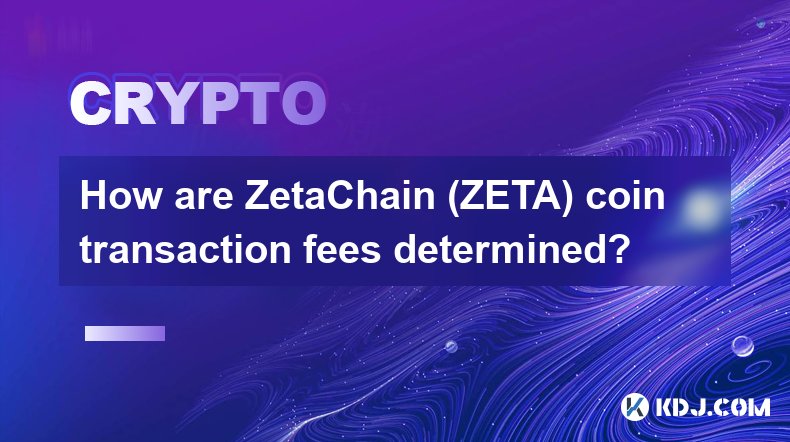
Key Points:
- ZetaChain (ZETA) utilizes a novel cross-chain routing and settlement protocol to facilitate interoperability between different blockchains.
- The transaction fees on ZetaChain are dynamically adjusted based on various factors such as network congestion, transaction size, and gas price.
- Users have the flexibility to customize their fee preferences to prioritize transaction speed or minimize costs.
Steps for Determining Transaction Fees on ZetaChain (ZETA):
- Network Congestion Assessment:
The ZetaChain network monitors its transaction volume and block space availability to determine the level of congestion. During periods of high activity, fees are proportionately increased to incentivize miners to prioritize transactions.
- Transaction Size Calculation:
The size of a transaction on ZetaChain refers to the amount of data it carries. Larger transactions, such as those involving complex smart contract interactions or large data transfers, require more computational resources and thus incur higher fees.
- Gas Price Determination:
Gas price is a unit of measurement that represents the amount of ZETA tokens required to execute a transaction. Users can set their gas price within a specified range to influence the speed and cost of their transactions. Higher gas prices lead to faster processing but may increase fees.
- Dynamic Fee Adjustment:
ZetaChain employs a dynamic fee adjustment mechanism that automatically adjusts fees based on the prevailing network conditions. This ensures that fees remain competitive and fair while maintaining network efficiency.
- User-Defined Fee Customization:
Users have the option to manually specify their fee preferences by adjusting the gas price. This allows them to balance transaction speed with cost optimization. By setting a higher gas price, users can prioritize faster transaction processing, whereas a lower gas price can minimize fees but may result in a longer wait time.
- Cross-Chain Interoperability:
When transferring assets across different blockchains using ZetaChain, the transaction fee will depend on the fees associated with both the source and destination blockchains. ZetaChain provides transparent estimates of these fees to ensure users are aware of the total cost involved.
FAQs:
- What are the variables that influence the transaction fees on ZetaChain?
The transaction fees on ZetaChain are determined by network congestion, transaction size, gas price, and the fees associated with the source and destination blockchains.
- How does the dynamic fee adjustment mechanism work?
The dynamic fee adjustment mechanism monitors network conditions and adjusts fees accordingly to maintain efficiency and fairness.
- How can I minimize transaction fees on ZetaChain?
To reduce transaction fees, users can optimize by sending smaller transactions during less congested times and choosing a lower gas price.
- What are the advantages of using ZetaChain for cross-chain transactions?
ZetaChain offers secure and efficient cross-chain interoperability, providing a seamless experience for asset transfers between different blockchains.
Disclaimer:info@kdj.com
The information provided is not trading advice. kdj.com does not assume any responsibility for any investments made based on the information provided in this article. Cryptocurrencies are highly volatile and it is highly recommended that you invest with caution after thorough research!
If you believe that the content used on this website infringes your copyright, please contact us immediately (info@kdj.com) and we will delete it promptly.
- 95% of Dogecoin (DOGE) Network Activity Has Disappeared, Suggesting Considerable Decline in Activity
- 2025-02-28 10:55:33
- LINK price is expected to rise by 12.38% in the next 5 days according to our Chainlink price prediction
- 2025-02-28 10:51:39
- ONDO Price Struggles at Key Demand Zone: Will Bulls Step In or Will Support Fail?
- 2025-02-28 10:51:39
- Bitcoin (BTC) Dips 20% From ATH But Long-Term Bullish View Remains Intact
- 2025-02-28 10:51:39
- By William M. Peaster, Bankless
- 2025-02-28 10:50:32
- XRP Price Drops, Splitting Analysts into Bear and Bull Camps
- 2025-02-28 10:50:32
Related knowledge
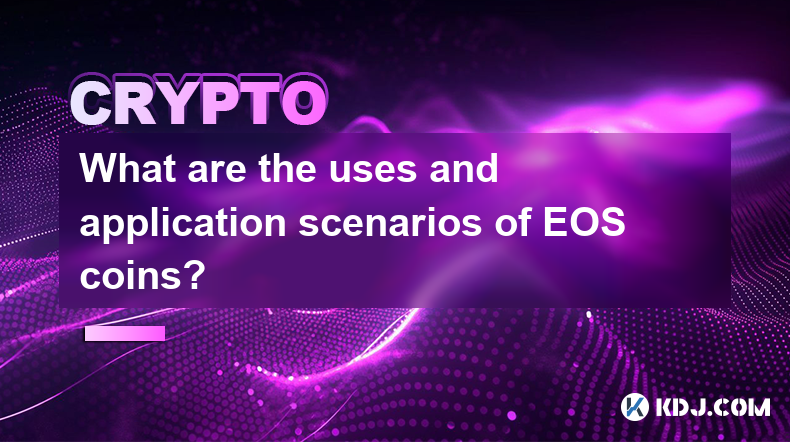
What are the uses and application scenarios of EOS coins?
Feb 26,2025 at 09:54pm
EOS: Decentralized Infrastructure for Scalable Blockchain ApplicationsKey Points:EOS enables the creation and deployment of decentralized applications with unparalleled scalability and efficiency.Its unique architecture features a high-throughput blockchain with zero transaction fees and the ability to process millions of transactions per second.EOS is ...
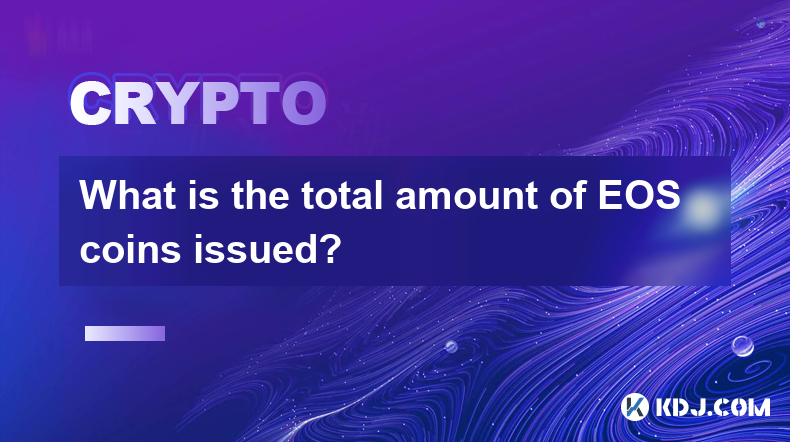
What is the total amount of EOS coins issued?
Feb 26,2025 at 06:24pm
Key PointsTotal Supply: Understand the concept of initial supply and its impact on EOS tokenomicsSupply Dynamics: Explore the various factors that affect EOS supply, including inflation and staking incentivesMarket Capitalization vs. Circulating Supply: Delve into the nuances between these metrics and their significance in token valuationDistribution an...
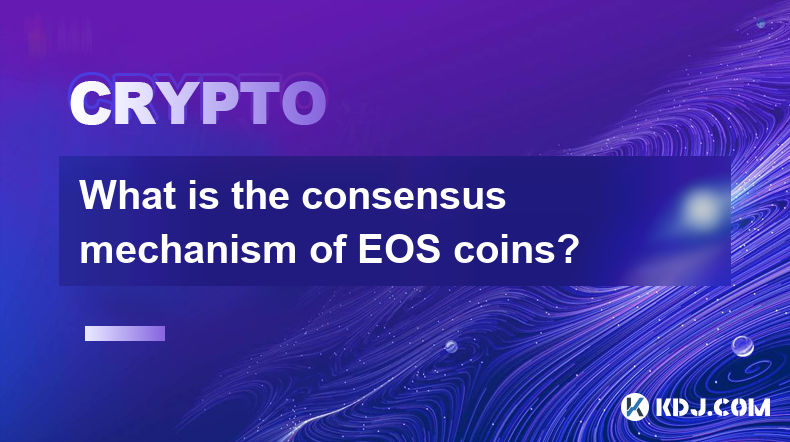
What is the consensus mechanism of EOS coins?
Feb 26,2025 at 11:19am
Key Points:EOSIO: The Foundation of EOS's Consensus MechanismDPOS: Delegated Proof-of-StakeBlock Producer ElectionsContinuous Block ProductionBlock Validation and IrreversibilityConsensus and Fork PreventionCommunity Governance and VotingWhat is the Consensus Mechanism of EOS Coins?EOS, an innovative blockchain platform, employs a unique consensus mecha...
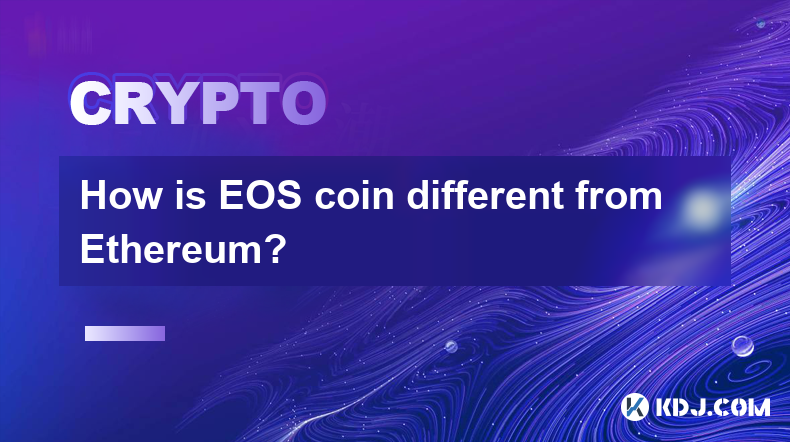
How is EOS coin different from Ethereum?
Feb 26,2025 at 10:48am
Key Points:Overview of EOS and EthereumDifferences in Consensus MechanismsAdvantages and Limitations of Each PlatformUse Cases and Target AudiencesComparison of Transaction Fees and ScalabilityCommunity Support and Development ActivityHow is EOS Coin Different from Ethereum?1. Overview of EOS and EthereumEOS and Ethereum are two of the most popular bloc...
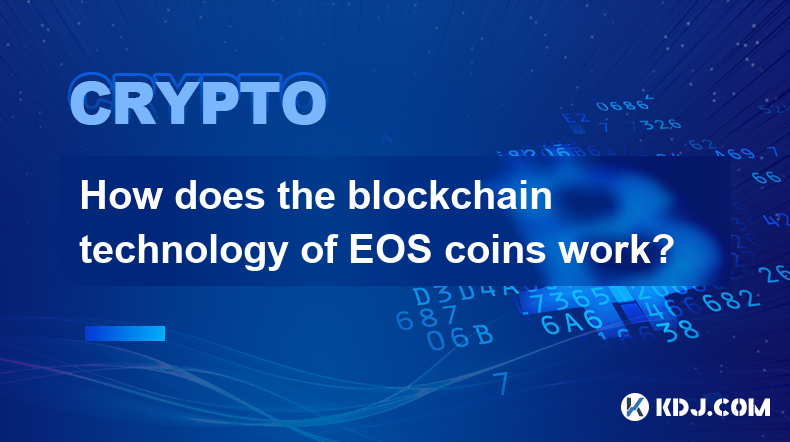
How does the blockchain technology of EOS coins work?
Feb 25,2025 at 11:13pm
Key PointsEOS is a blockchain platform that provides a high-throughput and scalable solution for decentralized applications.EOS uses a delegated proof-of-stake (DPoS) consensus mechanism to elect block producers and maintain the blockchain.EOSIO, the open-source software that powers EOS, offers a range of developer tools and features to facilitate the c...
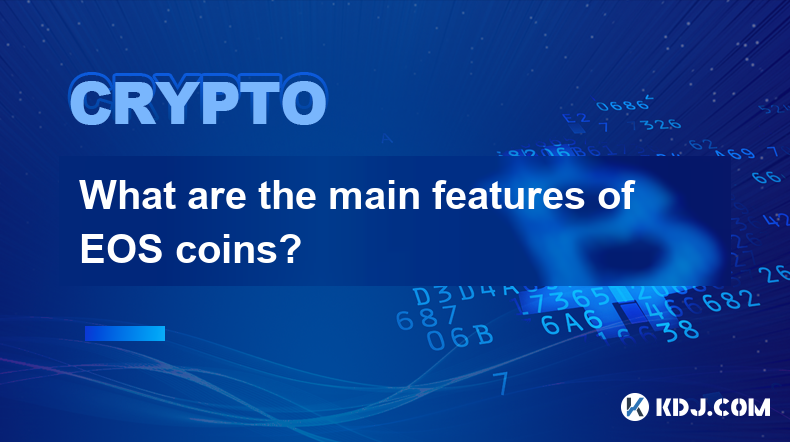
What are the main features of EOS coins?
Feb 27,2025 at 04:36pm
Key Points:EOS is a decentralized blockchain platform designed for building scalable and secure applications.EOS uses a unique consensus mechanism called Delegated Proof of Stake (DPoS), which improves transaction speed and efficiency.EOS has a robust ecosystem with a wide range of decentralized applications (dApps) and tools.EOS is known for its low tr...

What are the uses and application scenarios of EOS coins?
Feb 26,2025 at 09:54pm
EOS: Decentralized Infrastructure for Scalable Blockchain ApplicationsKey Points:EOS enables the creation and deployment of decentralized applications with unparalleled scalability and efficiency.Its unique architecture features a high-throughput blockchain with zero transaction fees and the ability to process millions of transactions per second.EOS is ...

What is the total amount of EOS coins issued?
Feb 26,2025 at 06:24pm
Key PointsTotal Supply: Understand the concept of initial supply and its impact on EOS tokenomicsSupply Dynamics: Explore the various factors that affect EOS supply, including inflation and staking incentivesMarket Capitalization vs. Circulating Supply: Delve into the nuances between these metrics and their significance in token valuationDistribution an...

What is the consensus mechanism of EOS coins?
Feb 26,2025 at 11:19am
Key Points:EOSIO: The Foundation of EOS's Consensus MechanismDPOS: Delegated Proof-of-StakeBlock Producer ElectionsContinuous Block ProductionBlock Validation and IrreversibilityConsensus and Fork PreventionCommunity Governance and VotingWhat is the Consensus Mechanism of EOS Coins?EOS, an innovative blockchain platform, employs a unique consensus mecha...

How is EOS coin different from Ethereum?
Feb 26,2025 at 10:48am
Key Points:Overview of EOS and EthereumDifferences in Consensus MechanismsAdvantages and Limitations of Each PlatformUse Cases and Target AudiencesComparison of Transaction Fees and ScalabilityCommunity Support and Development ActivityHow is EOS Coin Different from Ethereum?1. Overview of EOS and EthereumEOS and Ethereum are two of the most popular bloc...

How does the blockchain technology of EOS coins work?
Feb 25,2025 at 11:13pm
Key PointsEOS is a blockchain platform that provides a high-throughput and scalable solution for decentralized applications.EOS uses a delegated proof-of-stake (DPoS) consensus mechanism to elect block producers and maintain the blockchain.EOSIO, the open-source software that powers EOS, offers a range of developer tools and features to facilitate the c...

What are the main features of EOS coins?
Feb 27,2025 at 04:36pm
Key Points:EOS is a decentralized blockchain platform designed for building scalable and secure applications.EOS uses a unique consensus mechanism called Delegated Proof of Stake (DPoS), which improves transaction speed and efficiency.EOS has a robust ecosystem with a wide range of decentralized applications (dApps) and tools.EOS is known for its low tr...
See all articles

















































































